OTTAWA — Work is underway for a travel exemption that would let the winner of the NHL’s all-Canadian division and an American counterpart cross the border during the third and final rounds of the playoffs.
Two federal government sources say the exemption would let teams still in the Stanley Cup hunt enter Canada for games without having to isolate for 14 days, as is currently required for all non-essential travellers entering the country.
The sources, who were granted anonymity because they aren’t authorized to speak publicly, say the NHL has been working to secure approval from public health authorities in the provinces and cities that still have teams in the playoffs.
Once those signatures are collected, the request will go to federal Immigration Minister Marco Mendicino for final approval.
A league spokesperson said the NHL still is awaiting answers from governments.
The sources emphasized that public health and safety would be the top priority before any approval.
The winner of Monday night’s series-deciding game between the Montreal Canadiens and Toronto Maple Leafs will play the Winnipeg Jets in the North Division final.
The winner of that series will face one of three American division winners in the league semifinals. The two semifinal winners will square off for the Stanley Cup.
This will mark the first time regular cross-border travel occurs in the NHL during the COVID-19 pandemic.
NHL personnel were granted a special dispensation before the trade deadline in April to serve only a seven-day quarantine.
The league put all seven Canadian teams in one division, and they exclusively played each other to avoid cross-border travel this season.
In a best-of-seven series, one team traditionally hosts Games 1, 2, 5 and 7 and the other hosts Games 3, 4 and 6.
The NHL had said it was considering having the Canadian division winner relocate to the U.S. for the final two rounds if it could not secure approval from government.
Other Canadian professional sports teams have had to relocate to the U.S. to avoid cross-border travel.
Major League Baseball’s Toronto Blue Jays started their season playing home games in Dunedin, Fla., and will call Buffalo, N.Y., home starting on Tuesday.
Major League Soccer’s Toronto FC, CF Montreal and Vancouver Whitecaps have relocated to Orlando, Fort Lauderdale, Fla., and Sandy, Utah, respectively.
Major League Rugby’s Toronto Arrows are now based in Marietta, Ga., while the NBA’s Toronto Raptors recently completed their season in Tampa, Fla.
Canadian teams in leagues outside the NHL have a larger majority, if not a full complement, of rivals in the U.S., making cross-border travel a requirement if they are to play in Canada.
In the NHL, American teams have been allowed to have crowds throughout the playoffs. The Habs became the first Canadian team to host a crowd on Saturday when 2,500 fans watched them beat the Leafs in overtime.
That crowd was significantly smaller than those permitted in most U.S. venues.
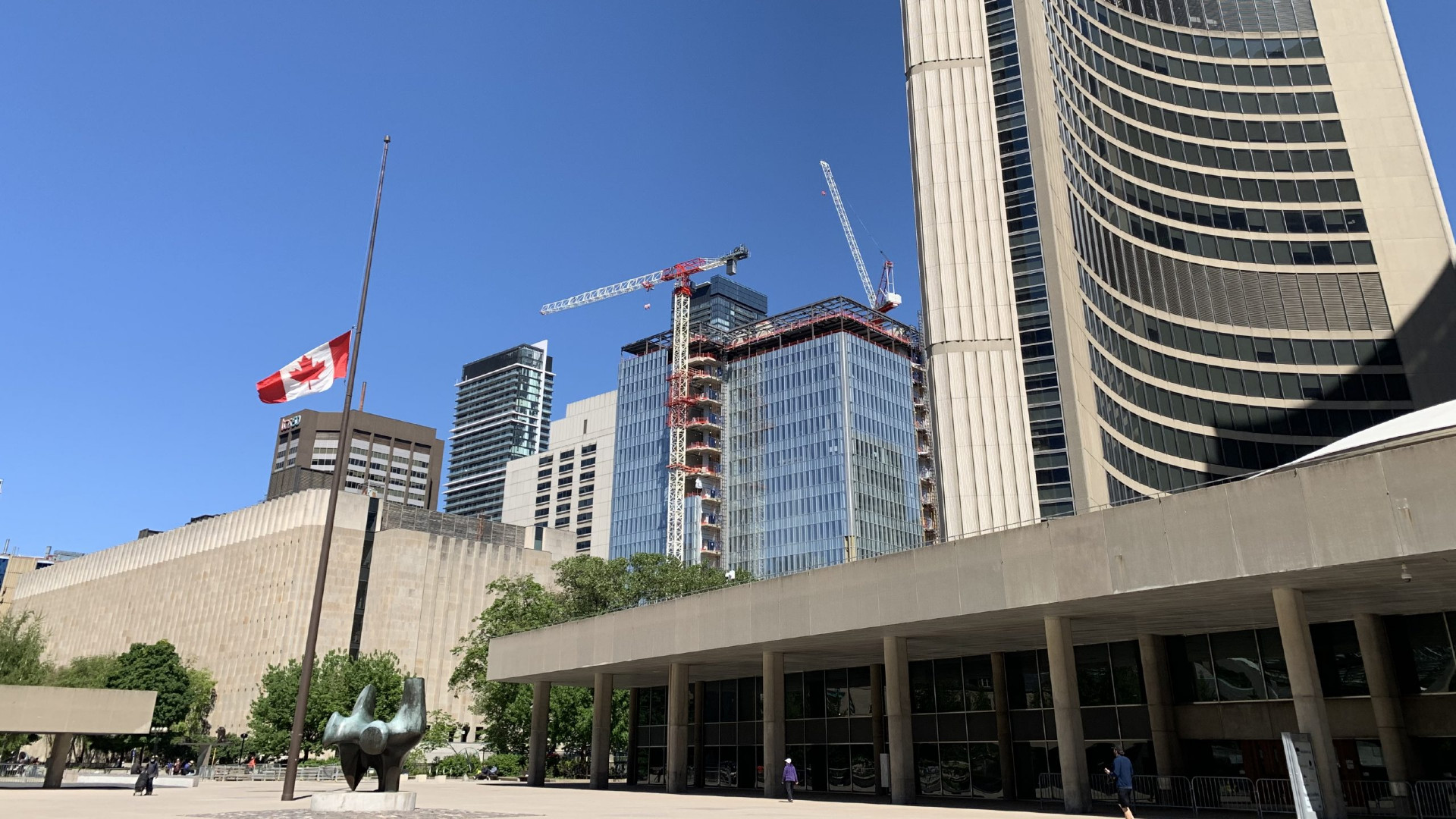
The City of Toronto lowered the Canadian flag outside of City Hall Sunday in memory of the Kamloops residential school victims.
Toronto Mayor John Tory said he spoke with the Mississaugas of the Credit First Nation Chief Stacey Laforme, who asked that the ceremonial flags be lowered.
“Today, the City’s flags are being lowered in memory of the 215 children whose bodies have been discovered,” Tory said in a tweet Sunday. “The flags will remain lowered for nine days — 215 hours to represent each life.”
The Toronto sign will also be dimmed to recognize the lives lost, he added.
A candlelight vigil was held Sunday night at Nathan Philips Square where 215 candles were lit in memory of the Native children found at the residential school site in Kamloops. Many in attendance wore orange shirts, a symbol recognizing the experience Indigenous peoples endured in residential schools.
“Their lives were taken for no reason,” said community member Danielle Migwans. “We need to recognize that this is an issue that needs to be really acknowledged and not just written down on paper.”
Many displayed signs or wore shirts that read “Every Child Matters,” and those in attendance said part of the vigil was to provide spiritual healing and closure through prayer, song and dance for the community, the families and for the 215 children.
“For generation after generation of children who survived these residential schools, they were unable speak about it because it was just too painful,” said Westwind Evening of the Matriarchal Circle of Toronto. “And it was only when we had the Truth and Reconciliation Commission and inquiry that they started to tell their stories.”
Both Mississauga mayor Bonnnie Crombie and Brampton mayor Patrick Brown have also asked that flags be lowered on their respective municipal buildings.
Trudeau asks for flags to be lowered to honour Kamloops residential school children
Flags on federal buildings should be flown at half-mast in honour of the 215 children whose remains were found at a former residential school in Kamloops, B.C., Prime Minister Justin Trudeau said on Sunday.
Trudeau said on social media his request includes the Peace Tower flag, and comes as communities across the country dedicate tributes to the children. Some called for a national day of mourning.
“To honour the 215 children whose lives were taken at the former Kamloops residential school and all Indigenous children who never made it home, the survivors, and their families, I have asked that the Peace Tower flag and flags on all federal buildings be flown at half-mast,” Trudeau said in a statement.
The children’s remains were located using ground-penetrating radar last weekend at the site in British Columbia’s Interior.
Trudeau’s flag call came as plans were being made to identify and return home the remains. The effort could involve the B.C. Coroners Service, the Royal B.C. Museum and forensics experts, Indigenous leaders have said.
Earlier this week, Chief Rosanne Casimir, of the Tk’emlups te Secwepemc First Nation in British Columbia, said the discovery of the children, some as young as three years old, is an “unthinkable loss that was spoken about but never documented” at the Kamloops Indian Residential School.
She said more bodies might be found because there were more areas to search on the grounds.
The Kamloops residential school operated between 1890 and 1969. The federal government took over the facility’ from the Catholic Church and ran it as a day school until it closed in 1978.
The National Truth and Reconciliation Commission has records of at least 51 children dying at the school between 1915 and 1963.
The Chief of the Mississaugas of the Credit First Nation, R. Stacey LaForme, wrote Trudeau on Saturday to ask the government to lower the flags and declare a national day of mourning.
“There is a lot more to be done but first and foremost, we need to do this to show love and respect to the 215 children, all of the children, and their families,” LaForme said in a statement. “This should be a moment that the country never forgets.”
Sol Mamakwa, an Indigenous NDP legislator who represents the Ontario riding of Kiiwetinoong, called on the province and Canadian government to work with all First Nations to look for remains at other defunct residential schools.
“It is a great open secret that our children lie on the properties of the former schools _ an open secret that Canadians can no longer look away from,” Mamakwa said in a statement. “In keeping with the Truth and Reconciliation Commission’s Missing Children Projects, every school site must be searched for the graves of our ancestors.”

If the Toronto Maple Leafs are to win the pivotal Game 7 in their opening round playoff series against the Montreal Canadiens, it will be done before an empty house.
Despite the fact 2,500 fans were in attendance Saturday night in Montreal, Ontario officials say there will be no spectators in the stands Monday night at Scotiabank Arena.
Brampton mayor Patrick Brown had called on the government to allow a similar number of fully vaccinated frontline workers to attend the game, even tweeting out a link to a petition hockey fans could sign.
“In hockey, fans in an arena are like having a 6th man on the ice,” he tweeted. “I can’t think of a more inspirational group of fans than essential workers & healthcare heroes who have been on the frontlines fighting Covid-19.”
Despite the petition garnering more than 10,000 signatures within hours of going live, a spokesperson for the Ministry of Heritage, Sport, Tourism and Culture Industries says they will continue to follow the advice of the Chief Medical Officer of Health and other health experts when it comes to permitting large gatherings.
“The return-to-play plan includes rigorous health and safety protocols developed to ensure the safety of players, staff, their families, and the community. At this time, no spectators are allowed to attend games in-person,” read the brief statement.
Under Ontario’s current Roadmap to Reopen, the reopening of indoor sports and/or recreational facilities would not be possible until 70 to 80 per cent of adults have received at least one dose of the COVID-19 vaccine and 25 per cent have been fully vaccinated.
According to the latest vaccination figures, just over 53 per cent of Ontarians have received their first dose of the vaccine.
Brown says the government’s position to not allow any indoor events until mid-August is inconsistent with what is happening in other jurisdictions across the country and around the world.
“The medical advice is clear, that its safe for fully vaccinated individuals to be indoors together and if Ontario is going to put a three month wait on those events being able to happen again, it would be inconsistent with the science that is available,” Brown tells 680 NEWS.
Despite the provincial statement, Brown is encouraging people to sign the petition noting that public pressure has already forced the Ford government to alter its stance when it comes to pandemic measures.
“If you look at this government… they had a position, there was no way they were going to open outdoor amenities like golf and tennis, but physicians spoke up, residents spoke up and now we have outdoor amenities open again,” explained Brown. “Because so many people spoke up, playgrounds were reopened after a day of playgrounds being closed.”
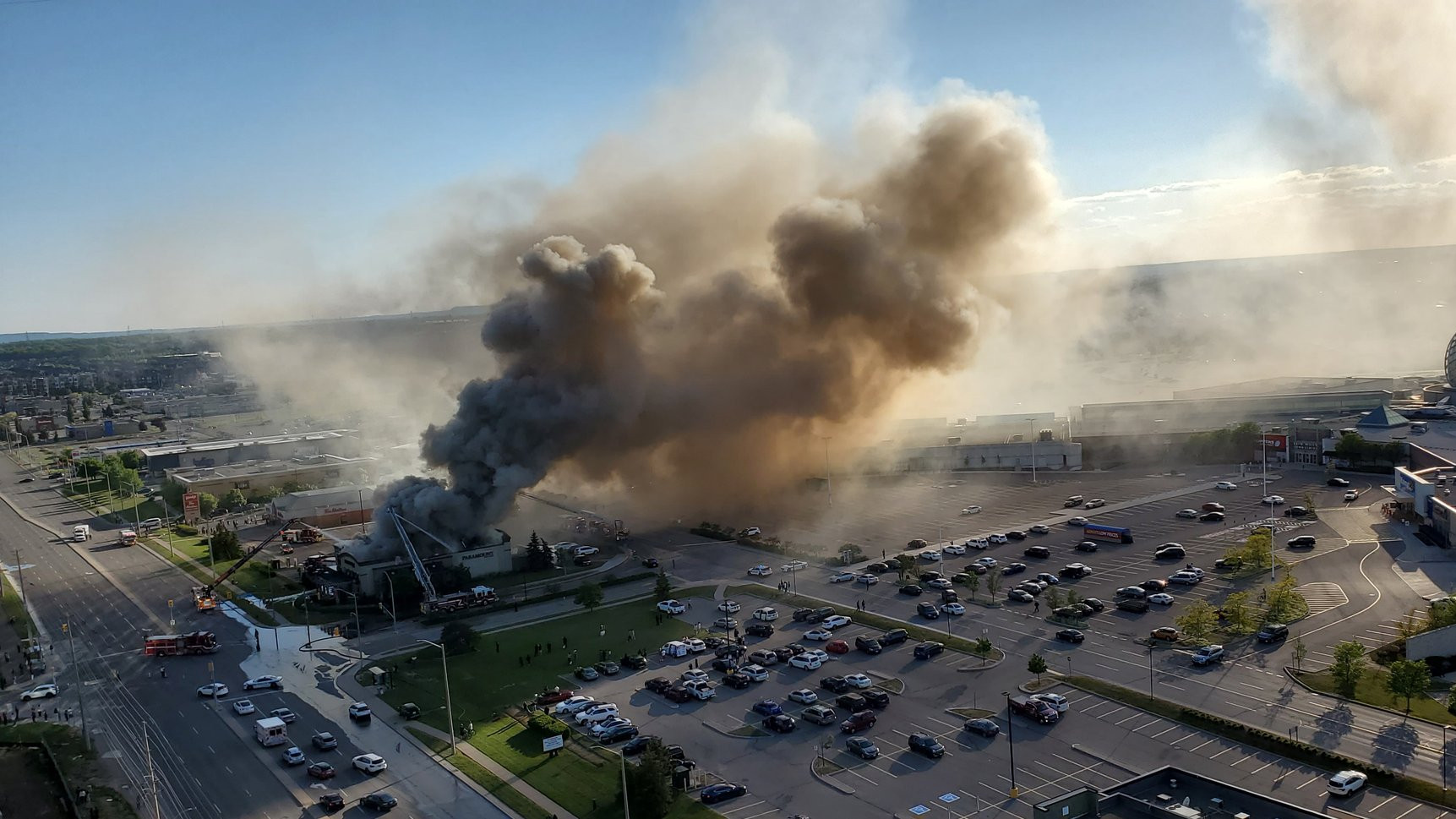
A massive fire Sunday night has destroyed a prominent Mississauga restaurant.
Fire crews were called to the Paramount Fine Foods location at the Erin Mills Town Centre around 6 p.m.
When they arrived heavy smoke could be seen billowing from the roof of the restaurant, and firefighters were soon forced into a defensive position to try and bring the blaze under control.
“One of the customers came [in] and said ‘fire on the roof, fire on the roof’”, said Mike Kashani, the owner of the Erin Mills location. “So we sent everybody out and called 9-1-1.”
Initially a two-alarm fire, it was subsequently upgraded to three-alarms as more equipment was brought in to help battle the blaze.
The roof of the restaurant eventually collapsed.
Both police and fire officials say there are no injuries and everyone who was in the structure has been accounted for at this time.
There is no word on the cause of the blaze. The Office of the Fire Marshal has been called in to investigate.
“We don’t have yet any information… sometimes things happen with the hood, with the exhaust system. We’ll find out soon the real reason behind the fire. Most importantly the staff and the neighbours are safe,” said Mohamad Fakih, founder and CEO of Paramount Fine Foods.
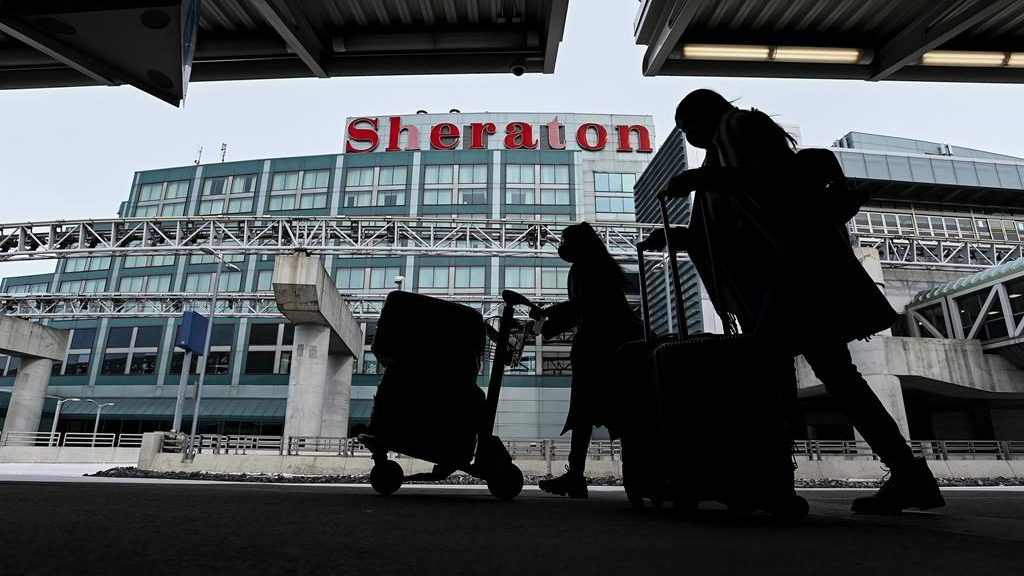
Canada’s requirement for air travellers to quarantine for up to three days at a hotel is an expensive, inconsistent policy that contains loopholes and should be ditched, says a new report from a government advisory panel.
The experts, mainly doctors, are tasked with providing guidance to Health Minister Patty Hajdu on testing and screening measures for COVID-19.
Its latest report focuses on Canada’s land and border measures, as well as what rules should be in place for vaccinated travellers, including that those who are fully immunized shouldn’t have to quarantine at all.
While it says Canada should continue screening positive cases from international travellers for more transmissible variants, it should discontinue its policy of making air travellers stay in “government-authorized accommodations.”
It recommends any changes to border measures happen in phases and factor in how the country is fighting a third and, in some ways, the most serious wave of the pandemic.
When it comes to the policy itself, it notes making those arriving by air stay at a hotel for up to the first three days of their 14-day quarantine has likely improved compliance. But it details several issues with the policy.
First, it says, some travellers are choosing to pay the fine of up to $3,000 for skipping out on their mandatory hotel stay and possibly not quarantining at all.
Besides the burden of forcing travellers to book and pay for a three-night stay at a government-approved hotel, the report says “there are significant administrative costs and resources devoted to managing hotel quarantine,” which could be used elsewhere to respond to the pandemic.
The experts say because only people flying into Canada have to quarantine at a hotel, some people are detouring to a United States airport and entering into the country through a land border where no such rule exists.
And finally, the panel said the three-day requirement doesn’t match up with the science around the incubation period of COVID-19.
“Recent research also indicates that specific supports related to financial support, temporary accommodation if necessary, clear communication, effective contact tracing and routine monitoring would help to increase compliance (as opposed to enforcing a specific quarantine location),” the report said.
The panel experts say the government should still see that travellers needing to quarantine who don’t have a plan be required to stay in designated quarantine facilities.
The panel’s criticisms have been the same questions Prime Minister Justin Trudeau and his ministers have faced for months since the rule was brought into effect earlier this year.
They have repeatedly defended the country’s border measures as effective and necessary to fight the spread of the virus.
Asked earlier in the day about the hotel quarantine policy, Trudeau didn’t say when it may end, given that more Canadians and other travellers are getting vaccinated against COVID-19.
“The Government of Canada will continue to monitor and review all available data and scientific evidence to inform future border and travel measures, and will be prudent in its approach, keeping the health and safety of Canadians top of mind,” reads a joint statement by Hajdu and Minister of Public Safety and Emergency Preparedness Bill Blair, following the report’s release.
“The Government of Canada will also consider the panel’s recommendations to determine how testing and quarantine strategies should evolve to address vaccination status.”
The report says travellers who have received one of their two shots should have to provide proof, get tested for COVID-19 72 hours before their arrival and then upon entering Canada. They should then quarantine at home until they receive their negative test.
The experts say fully vaccinated travellers should also show proof, but not be tested before their departure and should only undergo one upon arrival “for surveillance purposes.”
“Self-monitoring for symptoms and no quarantine required unless the on-arrival PCR test confirms a positive result,” they say.
Their report says unvaccinated travellers who are not deemed to be essential workers should take a test before their departure and on arrival. They should then take another test seven days into their quarantine and “then leave upon receipt of a negative test.”
If people who haven’t been vaccinated don’t take the test midway through their quarantine, they should be forced to stay in it for the full 14-days.
“The panel also acknowledges that there will be a number of considerations regarding vaccine ‘certification,”’ the report says.
“A system to validate proof of vaccination for arriving travellers should be made available as soon as possible.”

With a good internet connection being a vital lifeline during the COVID-19 pandemic, Rogers Communications announced Wednesday that they have partnered with the Mississaugas of the Credit First Nation (MCFN) to provide high-speed broadband services to the community.
Chief Stacey Laforme says First Nations often get left behind when it comes to such services and the COVID-19 pandemic has highlighted the problem further.
“It’s always been a challenge having internet connection out here, but we’ve really noticed it because the children rely on it to go to school,” he told CityNews. “The pandemic has really shown us the need for that connectivity.”
Chief Laforme said like thousands of others, the MCFN community needs to stay connected via virtual tools like Zoom to maintain both personal and professional connections.
“It absolutely is [a necessity.] It’s essential not only for business, but we have arts and artists that need to connect and be involved in their business and they’re showcasing what they can do [online],” he said. “We have interactions with each other and families that need to occur during the pandemic, so this is really, really important for us.”
Rogers will invest $1.4 million in expanding its fibre network to deliver “fibre-to-the-home technology” to over 275 homes and businesses in the community, across 30 square kilometres.
The communications giant says it will work with local contractors to build the network and will continue to explore ways in which it can help the community’s economic growth.
Chief Laforme says Rogers has been a good partner in the initiative and it will help “transform the lives of everyone” in the community.
He recalls that the conversation about MCFN getting high-speed internet dates back to over a year ago, when he met Rogers officials at an event in Toronto and discussed having a conversation about the community’s internet needs.
“About six months later I hadn’t heard anything, so I got in touch with some friends at Rogers and said ‘it’s about time we had that conversation’,” he said. “They said ‘absolutely’ and they reached out and we set up a committee here at MCFN to work on it.”
The project is slated to begin construction in July and services will be available by early 2022.
“This partnership and partnerships like it are the mainstay for the Mississaugas of the Credit First Nation,” said Chief Laforme. “We’ve worked very hard to develop relationships and friends and it means a lot. As you can see, when times of crisis hit, it’s good to have friends.”
Rogers is the parent company of this website
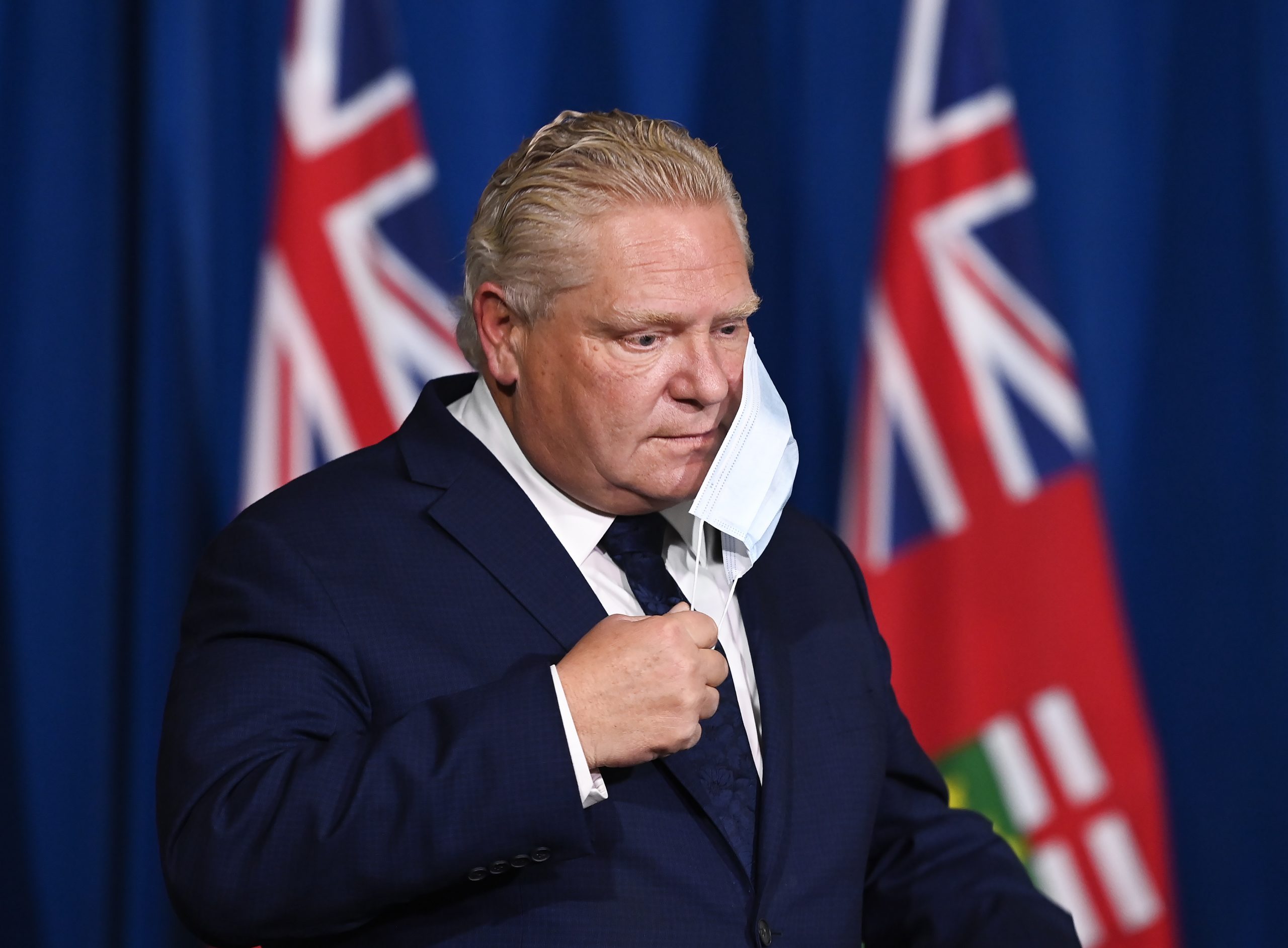
Premier Doug Ford has issued an open letter to educators, scientists, doctors, and unions asking seven key questions in an effort to find a consensus as to whether the province can safely reopen schools for in-person learning.
In the letter, Ford says “no one wants to see our schools reopen safely more than I do,” adding that while his government understands the benefits of having kids return to class, it can only be done based on “sound scientific advice, consensus and considers potential or future risks faced by students and staff.”
“In recent weeks, there has been a wide range of advice and commentary around the reopening of schools in Ontario,” wrote the Premier.
In the letter, the Premier posed seven questions to doctors, scientists, and educators saying he expects to gather their responses by 5:00 p.m. on Friday before his government can ultimately reach a decision.
- Is the reopening of schools for in-person learning safe for students?
- Is the reopening of schools for in-person learning safe for teachers and all education staff?
- There are a growing number of cases in Ontario of the variant first identified in India (B.1.617). Does this mutation pose an increased risk to students and education workers?
- The modelling from the Ontario Science Table has suggested that reopening schools will lead to an increase in cases in the province of Ontario, is this acceptable and safe?
- Other countries are warning mutations including the B.1.617 variant are putting children at much greater risk and is shutting schools down. Is this concern not shared by medical experts in Ontario?
- Should teachers be fully vaccinated before resuming in-class lessons and if not, is one dose sufficient?
- Under Ontario’s reopening plan, indoor gatherings won’t commence until July. Should indoor school instruction resume before then?
“There is consensus in some quarters on how, when and whether schools should reopen, and diverse and conflicting views in others,” Ford continued.
“Keeping children safe is our foremost consideration, which is why as experts in health, public health and education we are seeking your perspective.”
Ontario schools have been shut since April when they were the sources of more COVID-19 outbreaks than workplaces or any other location, the Premier said.
On Tuesday, Ontario’s Chief Medical Officer of Health Dr. David Williams said he would like to see schools resume in-person learning before the province enters the first step of its reopening plan in mid-June.
Williams says he has heard from many public health agencies, including those in the hard-hit Toronto area, who want to see schools reopen.
On Thursday, he said the province’s schools are “ready to open when they are asked to do so.”
“I’ve been supporting opening schools for in-person attendance,” Williams reiterated.
Ford cites a recent study from Public Health England by the U.K. government, which he claims indicated a single dose of either the Pfizer or AstraZeneca vaccine was just 33 percent effective against the B.1.617.2 COVID-19 variant first identified in India.
“That variant is also on the rise in Ontario,” he wrote.
“As Premier, my priority throughout the COVID-19 pandemic has always been to protect the health and safety of Ontarians. We need now to ensure there are broad consensus from our medical, public health, and education experts that returning to school is the right thing to do. I’ve always said we have the best minds in the world right here in Ontario and that together we make the best decisions,” he continued.
“Ultimately, this is our government’s decision, but in light of the foregoing, and the diversity of perspectives on the safety of reopening schools, I am asking for your views on a number of issues.”
Ford also points to recent COVID-19 modelling released last week, that showed while circumstances are improving across the province, reopening schools – while manageable – could lead to an increase in infections.
That version of Ontario’s modelling noted that if schools were to reopen, they project it would lead to a 6 to 11 percent increase in new daily COVID-19 cases.
“We are expecting new modelling this week that puts the range of new cases associated with school reopening between 2,000 to 4,000 cases by the end of July. This is concerning,” he said.
In addition, many students are not yet vaccinated at all due to a lack of supply, he said.
The medical officers in Toronto and Peel Region say that they were still watching to see if COVID-19 cases dropped further.
The Toronto District School Board said it hadn’t heard from the government about resuming in-person learning as of Wednesday, but schools would be prepared to reopen.
“If we were directed by the ministry to return to in-person learning this school year, we should be able to get up and running relatively quickly – perhaps a few days,” spokesperson Ryan Bird said.
The Dufferin-Peel Catholic District School Board also indicated a few days of preparation would be needed to resume in-person learning.
A spokesman said the board would have to ensure bus drivers are prepared to return, and that buses are ready to run after two months.
In Peel Region, the top doctor said his health unit was in discussions with the government as it looks at a “provincial-wide decision related to in-person learning.”
“We continue to monitor the numbers in Peel and are optimistic that they are trending in a favourable direction that, if maintained, might support a return to in-person learning,” Dr. Lawrence Loh said in a statement.
Dr. Eileen De Villa, Loh’s counterpart in Toronto, said COVID-19 cases are still “relatively high” in her city but shared optimism that the situation could improve.
“I’d like to actually be able to see what the province makes their decision on and … what they decide to move forward with,” she said.
Both De Villa and Loh ordered schools to close in April due to soaring cases, days ahead of a province-wide decision to move classes online.

A spokeswoman for Education Minister Stephen Lecce said safety is a priority but did not indicate the status of any immediate plans to reopen schools.
Meanwhile, Ottawa’s top doctor told the city council on Wednesday that she considers COVID-19 levels low enough to reopen schools in her city.
Dr. Vera Etches referenced the importance of balancing COVID-19 risks with mental health harms.
She suggested teachers could take advantage of the warm weather with outdoor classes, along with other mitigation measures.
COVID-19 cases have dropped since schools were closed and a stay-at-home order was imposed but experts say resuming classes at this stage is not without risk.
Ontario teachers’ unions: Safety must be prioritized
Meanwhile, teachers’ unions repeated calls for stronger safety measures ahead of any possible reopening.
The president of the Elementary Teachers’ Federation of Ontario (ETFO) called for more health and safety supports.
“ETFO firmly believes that in-person instruction is the best experience for students, but it must be done safely, without risk to the health and well-being of students and education workers,” Sam Hammond said.
Harvey Bischof with the Ontario Secondary School Teachers’ Federation (OSSTF) said he would support in-person learning in certain areas with lower COVID-19 risk, but he wanted more clarity on any government plan.
“This is astonishing to me that we’re hearing public musings from the chief medical officer of health about reopening schools when there has been no proposed plan (and) there has been absolutely no transparency around the metrics upon which they’re basing this,” Bischof said in an interview.
He said the union sees returning to school, even for a short period of time, as worthwhile for students, but proper planning and consultation is needed.
“You can’t just turn things on a dime again without planning and support,” he said.
Toronto parent Jessica Lyons said she understands the frustration about online classes — her own elementary-aged kids “despise” online learning — but she likely wouldn’t send her children back to class even if schools do reopen before the term finishes at the end of June.
“I think it’s a bad idea,” she said.
Lyons, who is part of the Ontario Parent Action Network advocacy group, said she’s concerned by the heightened risk from COVID-19 variants, the lack of upgrades to safety measures and the fact that teachers and students are not yet fully vaccinated.
Critics accused Ford of sitting on his hands for many months, creating a last-minute scramble.
“It’s the end of May, and just now Mr. Ford is asking health and education experts for feedback?” New Democrat education critic Marit Stiles said. “Doug Ford needs to stop treating kids’ education as an afterthought.”
Green party Leader Mike Schreiner accused Ford of “fully abdicating his responsibility” by looking for a consensus.
“Being premier isn’t about being popular,” Schreiner said. “It’s about making the tough decisions but Ford continues to punt responsibility when it matters most.”
Liberal party leader Steven Del Duca said he hoped Ford would finally listen to the experts but called it “absurd” he had only given them one day to make their recommendation.
With files from the Canadian Press

Nick Suzuki’s goal in the first minute of overtime lifted the Montreal Canadiens to a 4-3 win over the Toronto Maple Leafs in Game 5 of their Stanley Cup opening round playoff series.
Cole Caufield intercepted an errant Alex Galchenyuk in Montreal’s zone and moved in on a 2-on-0 breakaway with Suzuki, who made a pass to Caufield after crossing into Toronto’s zone before getting the puck back from his rookie teammate to beat a helpless Jack Campbell blocker side.
Joel Armia, with two, and Jesperi Kotkaniemi had the other goals for Montreal. Carey Price made 32 saves.
Jake Muzzin, with two, and Zach Hyman replied for the Leafs, while Campbell stopped 26 shots.
With the win the Canadiens avoided elimination, forcing Game 6 in Montreal on Saturday night where as many as 2,500 fans will be in attendance – the first Canadian NHL crowd in Canada since the start of the COVID-19 pandemic in March 2020.
The Winnipeg Jets await the winner of Toronto-Montreal following their surprise sweep of Connor McDavid’s Edmonton Oilers in the North Division’s other first-round series.
Files from The Canadian Press were used in this report
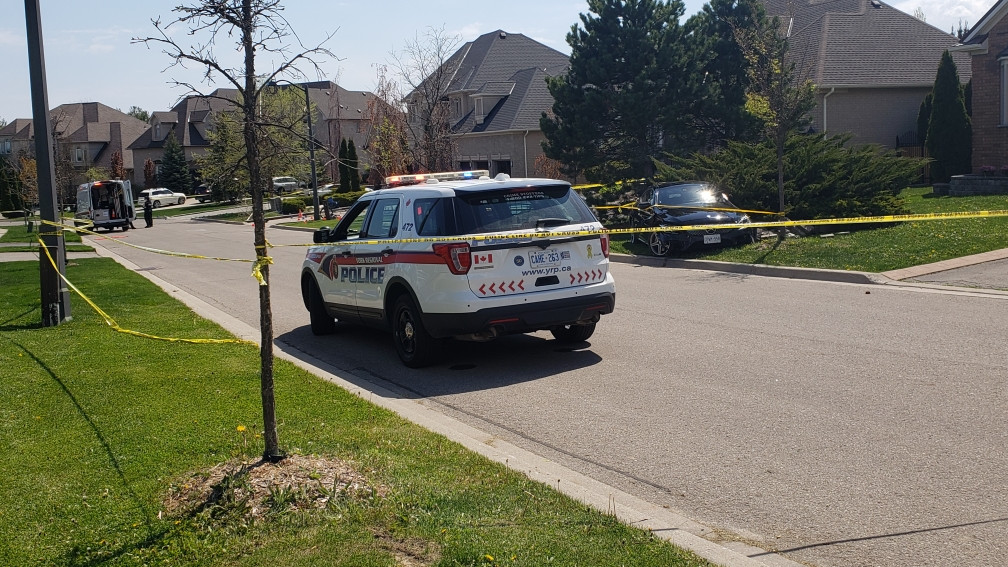
A 16-year-old boy charged in connection with a crash in Vaughan that left two children dead has been released on bail, his lawyer told CityNews.
The hearing was held on Wednesday and the bail conditions include house arrest.
A 10-year-old girl and her four-year-old brother both died after they were struck by a car that veered off the road on Athabasca Drive, just off Dufferin Street north of Teston Road, on May 16.
A neighbour who was with the children was also hurt, but his injuries were not life-threatening.
The teen driver from Richmond Hill has been charged with:
- Two counts of Dangerous Operation Cause Death
- Two counts of Criminal Negligence Cause Death
- Two counts of Dangerous Operation Cause Bodily Harm
- Two counts of Criminal Negligence Cause Bodily Harm
His next court appearance is on June 17.
Last week, the family of the two young siblings released a statement through York regional police.
“We are extremely traumatized by the tragic loss of our daughter and son,” the family said. “The past days have been extremely difficult for our family. We appreciate the prayers and thoughts of all those grieving with us.”
Police added that the family requested privacy and don’t want names or photos of their children released at this time.

EDMONTON (CityNews) — Oilers defenceman Ethan Bear has allegedly been receiving racist messages on his social media following Edmonton’s first-round playoff loss to the Winnipeg Jets this week.
In a social media post, Bear’s girlfriend Lenasia Ned says the Oilers player, who is Indigenous, has been receiving hateful, racist messages by fans.
Fans are apparently blaming Bear, who made a mistake in Edmonton’s triple overtime loss in Game 4, for the Oilers’ four-game sweep in the playoffs.
“Ethan has received numerous racist messages and comments,” wrote Ned in a message posted to her Facebook and Instagram. “To hide behind a screen is cowardly. But to use stereotypes against him as an Indigenous person is dehumanizing and awful!!
“We will not be silenced. We will not except (sic) this behaviour. It’s 2021 we are all equal and this needs to stop.”
Many of the replies to the initial post were overwhelmingly positive. Ned said Bear appreciates the love and support from everyone else.
“Ethan has broken countless barriers as an Indigenous man to make it to the NHL,” she wrote. “He is human. We understand there is criticism but there is no room for racism.”
Bear, with Ned at his side, addressed the situation with a statement in a two-minute video posted to social media on Wednesday.
“I know this doesn’t represent all Oilers fans or hockey fans, and I greatly appreciate your support and love during this time. I’m here to stand up to this behaviour, to these comments. I’m proud of where I come from, I’m proud to be from Ochapowace first nation. I’m not just doing this for myself, I’m doing this for all people of colour, I’m doing this for the next generation, to help make change to love one another, to support one another, to be kind to each other. There’s no place for racism in our communities, in sports or our workplace.”
“I call on all of us to make change and end racism.”
The Oilers followed Bear with their own statement.
“The Edmonton Oilers Hockey Club is equally disappointed in these disgusting, cowardly and racist remarks. While we have witnessed progress in the area of equality and inclusion, this reprehensible behaviour demonstrates we still have significant work to do.”
“We call upon everyone in Oil Country to stand up to racism, call out hatred and do their part in making our community one of acceptance, inclusion and respect.”
The NHL also released a statement on Twitter later Wednesday.
“Ethan Bear represents both our game and his Indigenous heritage with dignity and pride,” the NHL said. “He, and all people from Indigenous backgrounds, deserve to feel empowered and respected on and off the ice. We stand with Ethan and his family in denouncing hate.”
Oilers GM Ken Holland addressed the alleged incident in his year-end media availability on Wednesday, saying he would reach out to Bear to offer any support needed.
“It’s totally unacceptable and disgusting,” said Holland.
The GM calls Bear an “unbelievable young man.”
“He’s a tremendous role model for all young athletes, especially in the Indigenous community,” Holland said. “He gives time to the community. He’s popular in the locker room.
“Two summers ago he spent his entire summer here in Edmonton in the gym every morning with our strength coach, focused, determined, committed to get himself in the best shape he could as an athlete to come into training camp to compete for a spot with out hockey team and he made our hockey team.
“I feel sick for him, I feel disappointed for him that he would he would get this kind of abuse. I think we’ve made strides, but there’s a long way to go to create a world where we’re where everybody feels safe and they don’t get this kind of racism and abuse.”
The 23-year-old Bear, from the Ochapowace Nation in southern Saskatchewan, is one of a small handful of active Indigenous players in the NHL, a list that includes Montreal Canadiens star netminder Carey Price and Stanley-Cup winner T.J. Oshie of the Washington Capitals.
In a letter issued prior to statements made by Bear, Holland, the Oilers and the NHL, Alberta’s Treaty No. 6 Chiefs said they were appalled at the racism directed towards Bear.
“The Chiefs condemn this act of violence toward Ethan, and are concerned by the lack of response by the Edmonton Oilers for not responding to this critical issue. Far too often our athletes and people are subject to acts of racial slurs and inappropriate derogatory language referencing the race of our people in sports.
“We call upon the National Hockey League to immediately take action to address this conduct of racism and hate towards First Nations people, especially at this time toward Ethan.”
Several took to social media to show their support of Bear, including former players, journalists, broadcasters and politicians.
Former NHLer Andrew Ference, who captained the Oilers for two seasons before retiring, said hockey had no place for racist fans.
“Ethan Bear is a very good hockey player. Lift him up and he will be an integral part of any success the Oilers have in the future.
“More importantly, Ethan Bear is an incredible human. If you’re sending racist remarks his way, you’re just a [expletive]. Hockey doesn’t want you.”
Alberta NDP Leader Rachel Notley also expressed her support of Bear.
“Ethan Bear, you’re an amazing athlete and ambassador for our community,” she tweeted. “You played so hard for the Oilers this year and have inspired so many youngsters. There is no place for racism in Edmonton. We must all be anti-racist.”
CityNews reached out to the Jets organization regarding the comments. True North Sports + Entertainment, the owner of the Jets, directed us back to a statement issued Thursday regarding racism in general, in which they said the murder of George Floyd was a “tragedy” and a “seminal moment in history that significantly raised awareness for issues of racism, social justice, diversity, and equity.”
–with files from The Canadian Press











